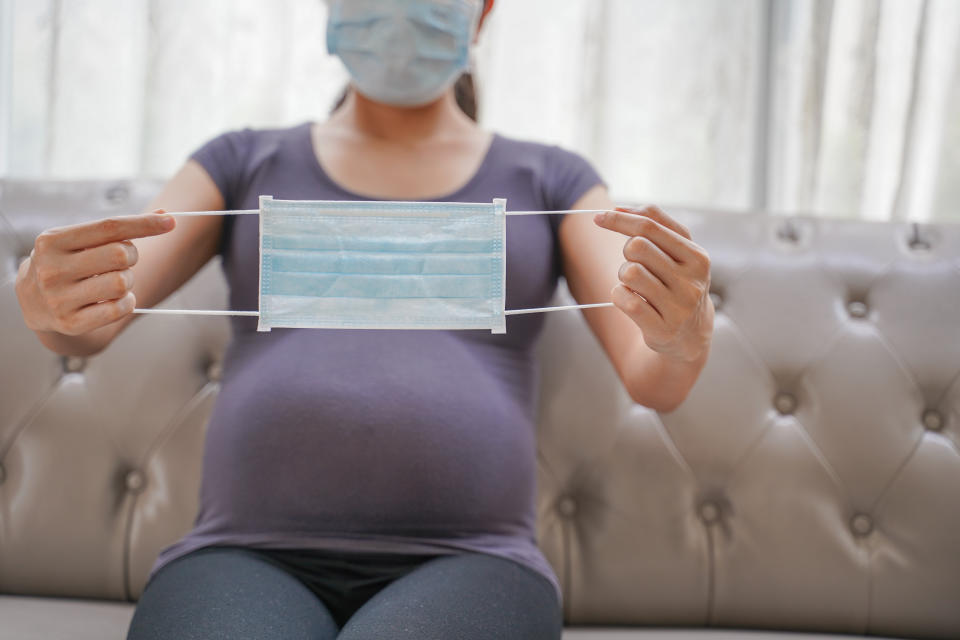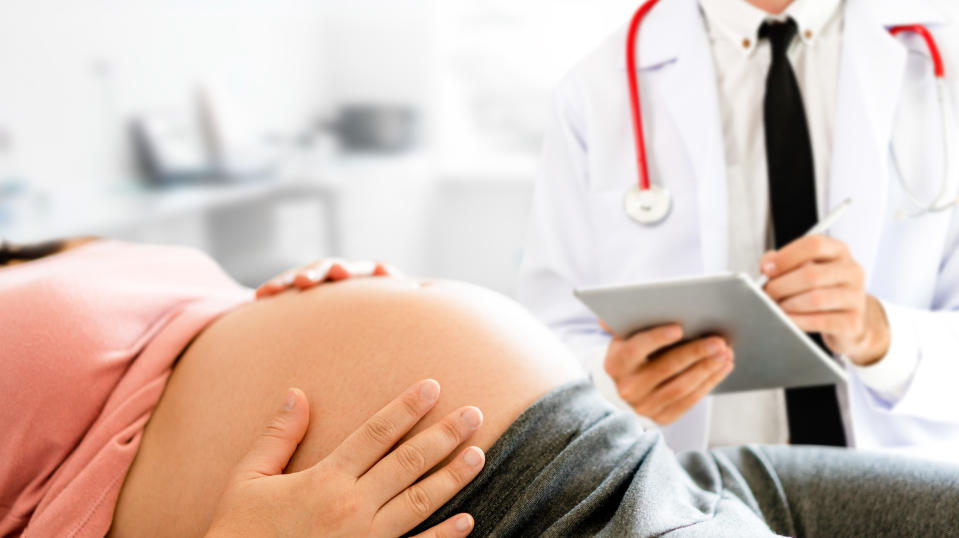Pregnant women less likely to develop fever with coronavirus, study suggests

Pregnant women may not develop the coronavirus’ tell-tale fever, research suggests.
Scientists from the University of Birmingham looked at more than 11,000 mothers-to-be across 77 studies.
They found pregnant women diagnosed with a suspected or confirmed infection in hospital were 57% less likely to report a fever.
While the overall risk is low, the results also revealed the pregnant women were 62% more likely to be admitted to intensive care and had 88% higher odds of requiring ventilation. This specific claim has been disputed by some experts, however.
Read more: Coronavirus spread on flight after passenger used the toilet
Early in the outbreak, concerns were raised as to how the pandemic may affect a developing baby, with infections and pregnancy being “not a good combination in general”.
Previous studies have thrown up mixed results, however, the latest Birmingham research links the infection to both a premature birth and greater odds of a newborn being admitted to neonatal care.
Not everyone is convinced, however, with some experts arguing the data is misleading.

Erring on the side of caution, England’s chief medical officer Professor Chris Whitty has placed pregnant women in the “vulnerable group” amid the coronavirus outbreak.
Pregnancy is known to sometimes “change the way the body handles severe viral infection”.
The Royal College of Obstetricians and Gynaecologists (RCOG) has stressed “there is no evidence pregnant women are more likely to get seriously ill from coronavirus but pregnant women have been included in the list of people at moderate risk (clinically vulnerable) as a precaution”.
Read more: Just 1% of severely ill children died in coronavirus study
It therefore advises expectant mothers be particularly cautious when it comes to social distancing and face coverings, while continuing to lead a healthy lifestyle and attend check-ups.
The Birmingham scientists felt “published reviews on COVID-19 [the disease caused by the coronavirus] in pregnancy quickly become outdated as new evidence emerges”.
They therefore looked at the more than 11,000 expectant mothers, some of whom had only recently become pregnant.
Results, published in The BMJ, reveal the pregnant women were less likely to experience a fever than non-expecting females of a reproductive age.
They were also 52% less likely to develop muscle pain. Although not recognised by the NHS, the World Health Organization lists aches and pains as a “less common” coronavirus symptom.
According to the NHS, “it’s expected most pregnant women will experience mild or moderate cold or flu-like symptoms”.
Read more: Hospital sees heart disease patients drop by 53% during lockdown
The RCOG also states “most people with coronavirus have at least one symptom”, listing a fever, cough, or loss of taste or smell.
Professor Andrew Shennan from King’s College London wondered if pregnant women may appear asymptomatic because they are diagnosed during routine tests, rather than when they present with signs of the infection.
There was no difference between pregnant and non-pregnant women when it came to other symptoms, like a cough or muted senses.

The results also revealed the pregnant women were more likely to require intensive care or ventilation.
Professor Marian Knight from the University of Oxford pointed out, however, the intensive care finding “largely come from a single study from a large US dataset”.
“There is thus a high risk of misclassification,” she said.
“Comparing findings from two UK studies, both published earlier in the year in the BMJ, does not suggest that pregnant women with COVID-19 in the UK are at higher risk of intensive care admission or of dying compared with non-pregnant women with COVID-19.”
Dr Edward Morris from the RCOG added pregnant women are also more likely to require intensive care if they catch flu.
Nevertheless, the Birmingham scientists found the risk increased with age, a high body mass index, chronic high blood pressure and pre-existing diabetes.
The babies born to mothers with the coronavirus were also three times more likely to arrive prematurely, with a quarter (25%) of the overall infants being admitted to a neonatal unit.
“It is important to recognise that, whilst this review reports high preterm birth rates, a number of women affected by COVID-19 in pregnancy are still pregnant, and thus are not included in the study data,” said Professor Knight.
“This may make preterm birth rates appear artificially high. Preterm birth rates are likely to be lower once all women have given birth and their information is included.”
Perhaps reassuringly, stillbirth and death rates were low among all the newborns.
Concerns were raised early in the outbreak an infected mother could pass the coronavirus to her unborn baby.
After looking at all the research available up to April, scientists from Midwestern University in Arizona stated there was “no conclusive evidence” to back this up.
With some babies testing positive for the infection, it has been suggested they likely caught it “after being brought into the world rather than in the womb”.
This could be in the delivery room, via the birth canal or even from a mother’s fingers, experts have speculated.
The Birmingham scientists concluded healthcare professionals should be aware of potential risks among pregnant women with COVID-19, particularly if they have pre-existing risk factors.
“The findings of the review support ongoing social distancing measures for women in the latter stages of pregnancy to reduce the risk of pre-term delivery,” agreed Dr Edward Mullins from Imperial College London.
“There are unanswered questions on the impact of infection in early pregnancy and on transmission from mother to baby in the womb. which need to be addressed to further understand how this virus affects women in pregnancy.”

 Yahoo Sport
Yahoo Sport 






































